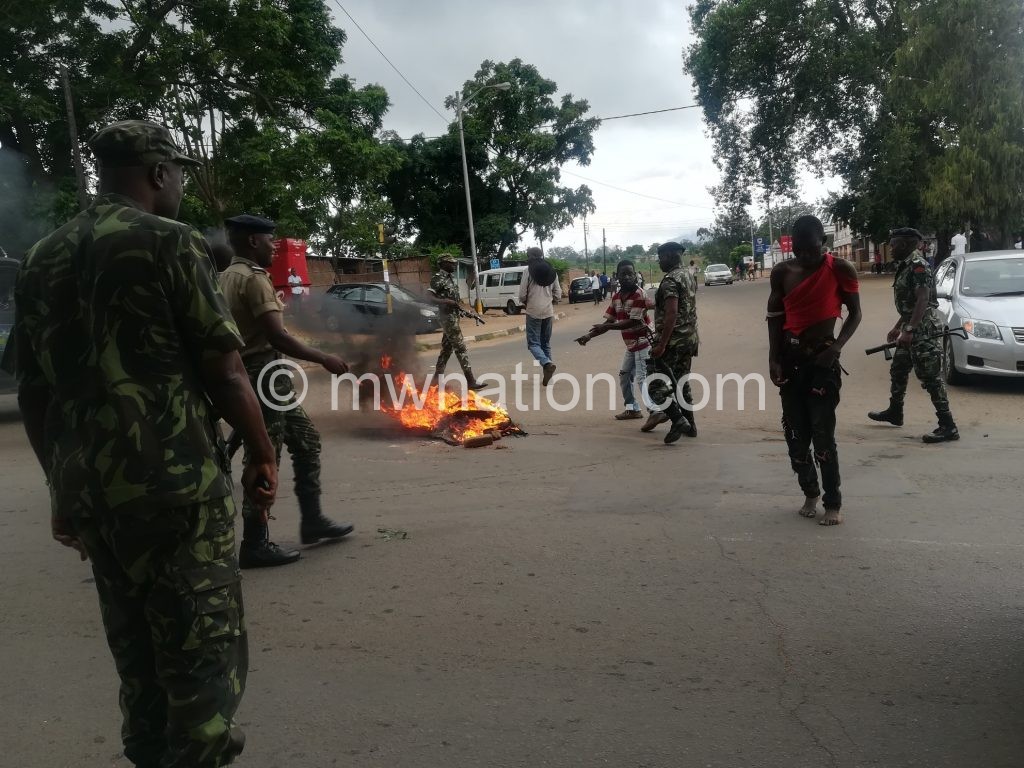Minibus owners granted wish
Minibus Owners Association of Malawi (Moam) have cancelled their planned nationwide strike scheduled for today after getting their wish to carry three passengers per row instead of two imposed as a precautionary measure against Covid-19 spread.
In a telephone interview last evening, Moam national chairperson Felix Mboonekera said the strike, which yesterday left commuters in Blantyre City stranded as the operators and drivers protested against last week’s fuel pump price hike and enforcement of the reduced seating capacity, will not extend to Lilongwe and Mzuzu.

He said: “They [government] have allowed us to start carrying three passengers per row and because of this agreement, the strike which we planned to extend to other areas will not proceed.”
Ministry of Transport and Public Works public relations officer Andrew Nthiko said Moam did not consult the ministry on the strike, but urged the operators to revert to seating capacity of three as was the case before Covid-19.
He said the issue of raising fares because of a fuel pump price hike was also beyond the ministry.
Commuters in Blantyre City yesterday had a rude awakening when minibus drivers boycotted services in protest of the upward fuel adjustments Malawi Energy Regulatory Authority (Mera) effected from Wednesday last week.
The strike paralysed public transport in the city as taxi operators, including kabaza [motorcycle-taxi] operators were forcibly blocked from picking the stranded commuters, most of them heading to their workplaces or businesses.
At places such as Kamba, Kudya, Chimwankhunda, Bangwe, Ndirande, Kachere and Lunzu, the protesting minibus drivers blocked key connecting roads from all traffic using rocks, logs and burning tyres.
Normalcy returned after anti-riot police moved in to quell the situation. In Bangwe Township, police fired tear gas to disperse the protesters.
In some cases, private vehicles carrying some passengers were also stopped and ordered to drop off the passengers.
In the course of the strike and unfolding events around it, scores of commuters were seen walking to their workplaces and businesses while some remained rooted at various minibus stages, hoping that the minibuses would be back on the roads.
Mboonekera said that at the peak of the pandemic in March, Moam, the Directorate of Road Traffic and Safety Services (DRTSS) and the Presidential Task Force on Covid-19 resolved to reduce the sitting capacity to two people per row as a precautionary measure to avoid the further spread of the pandemic.
He condemned some minibus drivers for harassing motorists who were picking up some of the stranded commuters.
Some of the disgruntled minibus drivers also demanded K2 000 from the motorists to pass through, a development that forced them to use alternative routes.
One of the commuters, a student at Exploits University, Thelma Nankwawa, said she was delayed to go write her end of semester examinations due to the strike as she had to walk from Manje to Chitawira.
In a separate interview, another commuter, a lecturer at Modern Education and Training Institute in Limbe, Innocent Banda, said there was need for authorities to address the matter before it gets out of hand as it will inconvenience people during the festive period.
While referring the matter to Ministry of Transport and Public Works, Presidential Task Force on Covid-19 co-chairperson Dr John Phuka yesterday said currently the risk is high; hence, they would want promulgated laws to be adhered to.
In a telephone interview, he said the task force does not want the country to feel the burden that was there between June and July when number of positive cases were high.
Reacting to the situation, Consumers Association of Malawi (Cama) executive director John Kapito said the minibus drivers have a right to express themselves through the strike as they are facing challenges.
“They have been losing money because of the Covid-19 reduced sitting capacity and now they have to pay high fuel prices amidst the Covid-19 restrictions,” he said.
The minibus drivers yesterday staged the strike despite adjusting their fares from Thursday last week with almost double the amounts depending on routes.
Mera board chairperson Leonard Chikadya announced last week that petrol had gone up by 20.87 percent from K690.50 per litre to K834.60/litre while diesel went up from K664.80/litre to K826.40/litre representing a 24.31 percent. Paraffin rose to K613.20/litre from K441.70/litre, representing a 38.83 percent.
During a media briefing announcing the new prices last week, Mera spokesperson Fitina Khonje attributed the increase to the rise in fuel landing costs and the depreciation of the kwacha by 3.37 percent since May this year.
In December 2018, petrol was sold at K923.50 per litre and diesel K949.60 per litre while in December 2019 petrol fetched K930 per litre and diesel K924 per litre.
In April this year, in the face of reduced demand on the world market due to restricted movements as a precautionary measure against Covid-19, pump prices went down.





